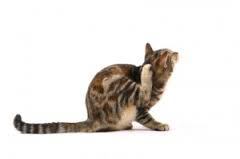What Is The Origin Of (105)?…
Flea in your ear
We deploy this phrase when we dismiss someone with words of sarcastic advice or reproof ringing in their ears. It denotes giving someone a sharp oral rebuke. The phrase first appeared in the written English language as far back as 1426 in John Lydgate’s The Pilgrimage of the Life of the Manhood, manhood denoting the human condition. Lydgate’s work in turn was a translation of a devotional work by the French Cistercian monk, Guillaume de Deguileville.
Flea is a term given to any small, flattened, wingless, bloodsucking insect of the order Siphonaptera. They are parasites and are best known for their prodigious ability to leap. Even today they can be found on even the best groomed of our domestic pets and in medieval times when hygiene and living standards were considerably lower you can imagine that they were frequently encountered in the home. If you were unfortunate enough to have a flea jump into your ear, the experience would doubtless have been unpleasant with the flea wriggling around, trying to jump to freedom and probably giving you a nip or two along the way.
Interestingly, though, Deguilville didn’t use the term to suggest a sense of irritation or discomfort, rather using it to denote the sort of spiritual emotion that is evoked by contemplating great wonders. Indeed, in mediaeval French the phrase “avoir la puce a l’oreille” was used to describe the amorous or sexual desire you felt for someone, a meaning it retained until at least the 17th century when Jean de la Fontaine wrote, “a longing girl/ with thoughts of sweetheart in her head/ in bed all night will sleepless twirl./ A flea is in her ear, ‘tis said”. The agitation caused a lovelorn maiden by thoughts of her beau were considered from a figurative standpoint akin to the frantic and jerky movements of an animal trying to rid itself of an unwelcome visitor from its ears.
And in more modern times the French use their version of the expression to denote having doubts or someone putting suspicions into your head. This sense is broadly repeated in similar expressions found in German, Italian and Greek, the flea perhaps taking the role of an external influence whispering messages of distrust into your ear. The Dutch use a flea in the ear to denote someone who is fidgety or restless, preferring to concentrate on the visible signs of someone or something being attacked by fleas.
Not for the first time is the English-speaking community at odds with our European friends. We have tended to concentrate on the physical discomforts that having a flea in your ear can cause and have used it figuratively through the centuries to equate that physical pain with the mental anguish caused on receipt of a stern telling off. The mathematician and alchemist, John Dee, wrote in a letter in 1586, although not published until 1659 in True Faithful Relation..and Spirits, “at length had such his answer, that he is gone to Rome with a flea in his eare that disquieteth him”. John Arbuthnot wrote in his History of John Bull, published in 1712, “we being stronger than they, sent them away with a Flea in their Ear”. Ryder Haggard in Jess, published in 1887, wrote “I sent him off with a flea in his ear, I can tell you”. No sign of doubt, suspicions or amorous feeling there!
Filed under: Culture, History Tagged: avoir la puce a l'oreille, Guillaume de Deguileville, John Arbuthnot, origin of flea in your ear, Siphonaptera












